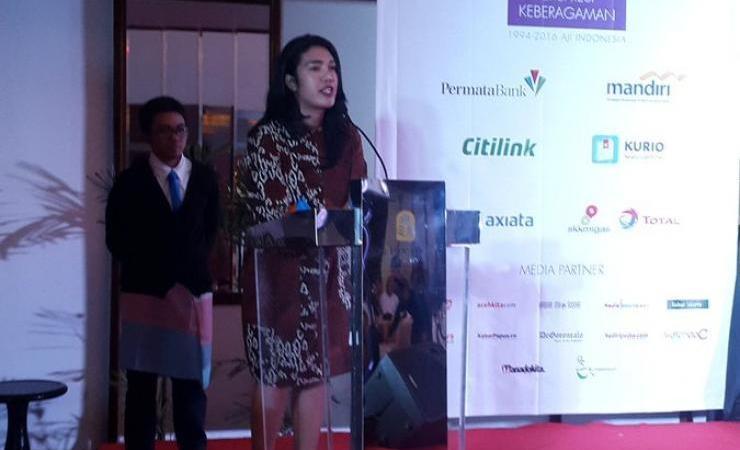ASIACALLING
Acknowledging Indonesia’s transgender community
"Vina’s feminine appearance often saw her teased and bullied at school, and also at home."

Kanza Vina received the Tasrif Award from the Alliance of Independent Journalists (AJI), this August in Jakarta. She was representing the LGBTIQ community.
On stage, Kanza spoke of her experiences of how she treated by her family, her school, and community because of her dominant femininity.
KBR journalist Ria Apriyani has this story.
Vina Kanza is a 23-year-old transgender woman, who was born in Bengkulu, on the Indonesian island of Sumatra.
Vina’s feminine appearance often saw her teased and bullied at school, and also at home.
“There was a senior transgender friend and they named me after her. I’m like the little version of her,” she says, “And when my parents heard that I was called sissy they were really angry. They would beat me if I hung out with the girls.”
At school, Vina says her and her tomboy friends were nicknamed the ‘people of Lut’ in religious class.
According to the texts, prophet Lut was sent to a town where sodomy was practiced.
When Lut delivered religious warnings about sodomy, the people ignored it and continued. In the end, they were destroyed by a dreadful disaster.
“We were called the people of Lut,” explains Vina, “In every religious subject that discuss Prophet Lut, they would refer to us, to our table. All the students would stare at us and the teacher would look at us in an uncomfortable way.”
When harassed by her classmates, the teachers blamed Vina rather than defend her.
“They blamed me because I am feminine. If I did not want to be called sissy, I had to fight. Moreover, my father was an authoritarian and fanatic,” she says.
In an attempt to flee the bullying and abuse, Vina fled to the capital of Bengkulu.
She was 15-years-old at the time and with no a diploma and skills, she had few options other than sex work.
Vina gradually grew more comfortable with herself, and started to wear the types of feminine clothes she had always wanted to.
But an encounter with her mom two years later in Bengkulu was devastating.
“I was shocked when I saw my mother, she was very skinny,” she says, “Because my father blamed my mother for failing to educate me. I thought this was a kind of trauma as well, and I felt guilty.”
Feeling bad for her mother Vina returned home, but her older brother wasn’t happy it so her father looked for a way out.
In 2009, the family gave Vina US$380 to start a business somewhere else.
At the age of 17, Vina and a friend went to Jakarta, but the money didn’t last.
She ended up in sex work again – until 2011, when Vina met the group SWARA, an NGO that supports the transgender community in Jakarta.
“Before I met friends in SWARA, I once said that I wanted to die young because I thought that life is not fair,” recalls Vina, “Yeah you can imagine! I came to Jakarta when I was 17 years old, living on the street. You know the risks of being a sex worker. The villains, municipal police, or bad guests. I was depressed. I even did not let my hair grow long.”
Since meeting Swara, things have calmed down.
Vina said she has learned a lot, about herself, about the transgender community, about human rights and the urban poor – all the things she did not learn in school.
Even though one day she wants to go back there too.
“I'm trying to get my high school diploma so I can continue my study at university,” she says, “I want to financially stable first because I do not want to stop halfway. I want to take law as the major because it’s important.”
These days Kanza Vina knows too that sexuality is not a disease – it’s not something to be cured.
- Ria Apriyani
- Kanza Vina
- Indonesia
- transgender
- Forum LGBTIQ Indonesia
Komentar (0)
KBR percaya pembaca situs ini adalah orang-orang yang cerdas dan terpelajar. Karena itu mari kita gunakan kata-kata yang santun di dalam kolom komentar ini. Kalimat yang sopan, menjauhi prasangka SARA (suku, agama, ras dan antargolongan), pasti akan lebih didengar. Yuk, kita praktikkan!